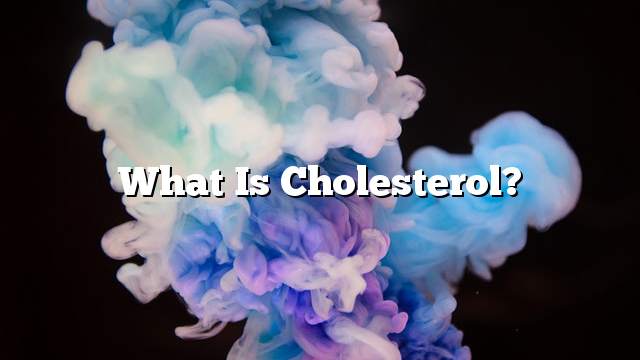Cholesterol is a basic fatty substance in the formation of cells, and performs several functions in the body, it is useful and harmful, and we will talk in this article about the concept of cholesterol and its functions, and health risks.
Cholesterol
- Cholesterol: It is a crystalline substance belonging to the steroids
- Cholesterol is soluble in oils and fats instead of water
- Cholesterol is attributed to the fat class
- Cholesterol is abundant in animal fat, brain, nerves, liver, blood and yellow juice.
- The liver makes about 80% of the total cholesterol in the body, and 20% cholesterol comes from the food we eat daily, especially animal sources.
- Cholesterol is transported from the liver to the rest of the body’s cells by special proteins called the lipid-producing proteins,
- Cholesterol combines once it reaches the blood with so-called lipoprotein or lipoprotein. If high-density lipoprotein is a useful cholesterol, it pulls cholesterol from the cells and walls of the arteries and returns it to the liver to remove it from the body. If low-density lipoprotein is that bad cholesterol .
Cholesterol functions in the body
- Construction of membranes and cellular walls by living cells
- It is an important component of the essential yellow juice acids for the process of digestion of fat
- It is used as a raw material for the production of vitamin D which is important for calcium absorption
- Cholesterol is used as raw material to manufacture sex hormones
- Enter into the structures of the brain and nerves
High blood cholesterol
- Deposition on artery walls and some blood vessels
- The walls of the arteries lose their elasticity, leading to atherosclerosis, which means that they can not widen and narrow with blood flow, leading to a complete blockage.
- A stroke in the heart and brain
Reduce blood cholesterol
Cholesterol is reduced by following several things, including:
Attention to nutrition
- Fish intake; it has a prominent role in protection against atherosclerosis and heart disease
- Eat more vegetables such as peas, beans, potatoes, whole-crust, corn, carrots, and broccoli
- Eat milk and its products are low or fat free
- Eat vegetables and salads, and make them one of the main items at your table
- Read the food ingredients of each product. Some are codified (low or cholesterol free) but contain lots of fat
- Eat grilled or boiled meat
- Eating fiber-rich foods plays an important role in helping to control the cholesterol level and make it healthy
- Eat pectin-containing fruits such as apples, pears, plums, grapes, and oranges
- Eat more foods containing whole grains such as whole wheat bread, brown rice, barley, and oatmeal
- Use a mixture of white flour and whole grain flour in baking
- Eat dry legumes such as beans, beans, and lentils
- Avoid too much fat
- Avoid red meat
- Avoid high-fat foods such as petitfor, cakes, cakes, pastries, sauces, and fast foods.
- Avoid eating chicken skin and birds
- Avoid high-fat foods, as they contain high levels of fat, butter, and animal fats, and their use in vegetable oils and high cholesterol foods such as the brain, egg yolks, liver, kidneys, hearts, quinones, and tongue.
Playing sports
- Try to exercise for half an hour three times a week, such as walking, cycling, swimming, or any action that increases heart palpitations for 15 minutes.
- Exercise is important because it is important to maintain cholesterol levels in blood, not only total cholesterol and low density, but also high density cholesterol.
- Consult your doctor before starting sports, especially if you are used to exercise, and exercise gradually.
Maintain weight
- Follow the principles of healthy nutrition while reducing the size of the unit of introduction of different foods with the adoption of a sports system; to increase energy consumption.
- Eat cereal, vegetables and fruits at each meal
- Eat your food from a variety of sources
- Eat low fat foods
- Reduce the content of your meals of salt, caffeine and sugar
- Try to reach and maintain your ideal weight
- Eat less calories than you consume daily
- Avoid ingesting weight loss diets on a scientific basis
Stay away from stress
You must arm yourself with the dream, serenity, satisfaction and acceptance of God’s judgment, taking a rest and relaxation after every period of hard work.
Stay away from smoking and alcohol
Smoking and alcohol are a major cause of cholesterol in the arteries, and even if you are not a smoker, you do not exist in an environment that is contaminated with cigarette smoke.
Take cholesterol medications
If your cholesterol stays high, it is okay to take your own medicine to reduce it after consulting your doctor.
